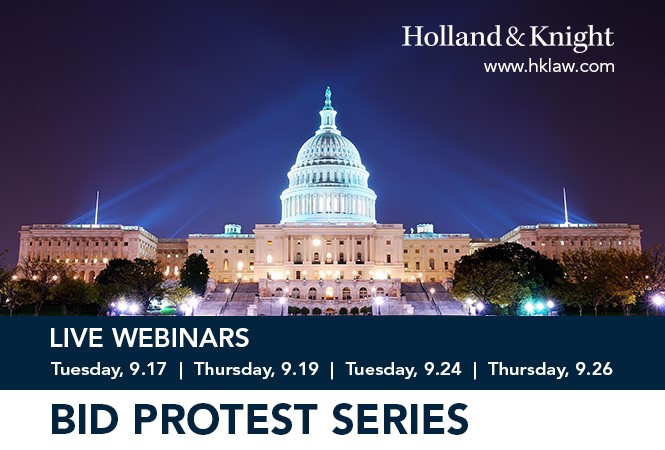Bid Protest Series Part 2: Protest Intervention – Defending Your Award
Holland & Knight Webinar

Holland & Knight's Government Contracts Group invites you to join us for our annual Bid Protest Series. We will present four one-hour webinars discussing bid protests and how to engage strategically and tactically in the process.
The federal government's fiscal year ends on September 30. Historically, federal agencies award hosts of contracts before that date to prevent the funding for those contracts from lapsing. For this reason, now is a good time for government contractors to "brush up" on bid protests and how to protect their interests in the procurement process.
In Part 2 of our Bid Protest Series, Terry Elling and Christian Nagel will focus on how an awardee can protect itself if a protest of its award is filed.
During this one-hour webinar, we will address:
- the procedure for intervening in a protest at the U.S. Government Accountability Office (GAO) or the U.S. Court of Federal Claims (COFC)
- the role of the intervenor's counsel in protecting proprietary information
- opportunities available to the intervenor to interact with and support the agency's counsel, raise arguments omitted by the agency, and otherwise provide input and advocacy to persuade the tribunal to deny the protest
- what to do if the agency decides to take corrective action
Register for the other webinars in this series:
- Part 1: Post-Award Protests at GAO – Preserving Opportunities on September 17
- Part 3: COFC Protests and Special Protest Situations on September 24
- Part 4: Small Business-Size Protests – Both Prosecuting and Defending on September 26
Continuing Legal Education
Holland & Knight is an approved CLE provider in several jurisdictions, including California, Georgia, Illinois, New York and Texas. All reasonable efforts to seek Ethics CLE credits for this program will be made. In certain instances, some programs may not be awarded CLE credits because of either content or jurisdictional restrictions. For New York attorneys, this program's format qualifies for CLE for transitional (newly admitted) and experienced attorneys.
